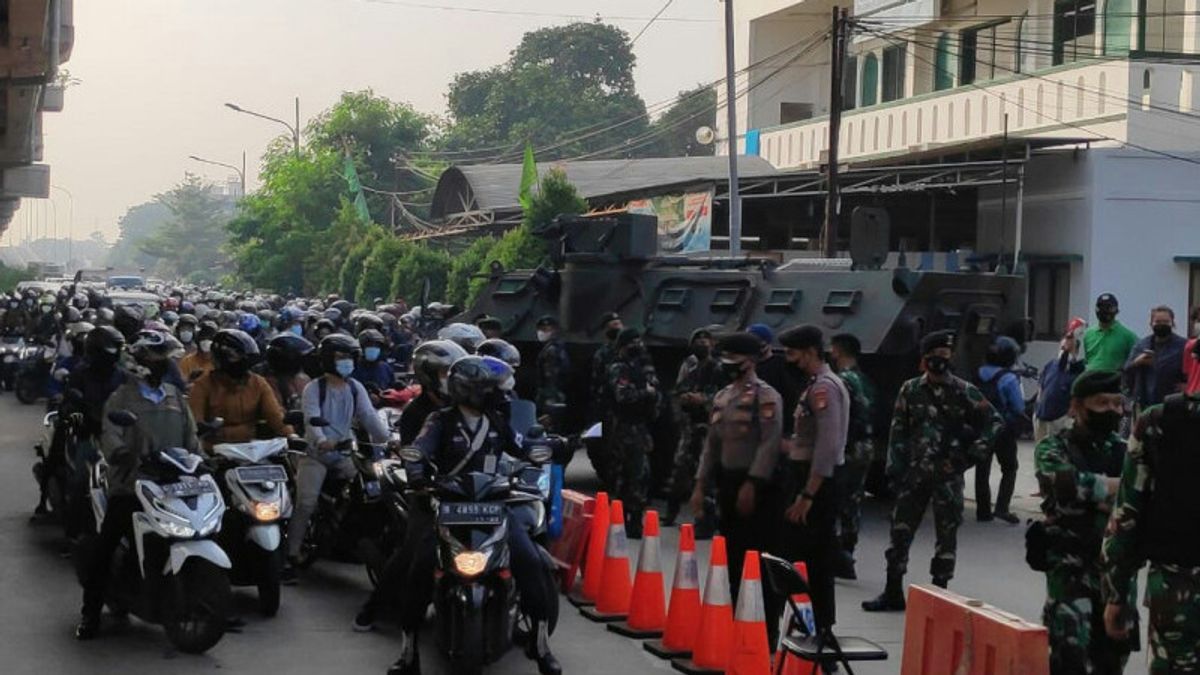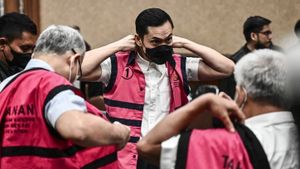JAKARTA - Emergency PPKM is entering its third day. It had no significant impact on Saturday and Sunday, and got even more tangled on its first working day, Monday, July 5. Can we hope in this policy?
There is no need to wait until the Emergency PPKM policy is completed. In just a week we can predict how our fate will be in the future. We have a chance to control this epidemic. But at the same time the possibility of this storm getting worse is very likely.
Dirlantas Polda Metro Jaya Kombes Sambodo Purnomo Yogo explained the police evaluation today. According to Yogo, there is still a lot of mobility from people outside Jakarta trying to enter Jakarta.
Officers must conduct checks on them at the isolation points. "Then the impact on the congestion is quite long at the blocking points."
"But traffic jams are something we cannot avoid because we enforce the rules," Yogo told reporters, Monday, July 5.
The average part of the human wave is workers. At these points of separation, the police must separate those who work for the essential sector and those who do not. The non-essential had to be turned around.

"But maybe there are health workers (nakes) or there are those who belong to this field of banking, who are hampered before entering the partition point, that it seems like they don't. Even though when they have entered that point, when he says 'nakes,' we will definitely open it," he said. yoga.
Yogo asked the public to understand this restriction policy. And for companies, the authorities will carry out inspections to the offices. Inspections are carried out to ensure companies comply with regulations.
"At the same time we check which offices are still not closed even though they are not critically essential. Including the rules, whether they are 100 percent WFH or percent WFO, or can be 100 percent WFO."
Policy implementationIn evaluations on Saturday, 3 and Sunday 4 July, authorities found a similar problem: human mobility. Indications of indiscipline have been evident ever since in fact, which was later proven on Monday.
If on Monday people left their homes to work, on two days last weekend the police found people out of their homes, even without any real interest. Yogo asked the public to obey.
"No matter how many thousands of officers are sent to the streets, if the people don't want to be orderly, they won't be able to. So to make this Emergency PPKM successful, there must also be awareness from the community," said Yogo.
The Head of Traffic at the Central Jakarta Metro Police, Kompol Lilik Sumardi, responded casually to the tangle - a build-up of people causing traffic jams on a number of roads in the capital. He hopes people will give up on leaving their homes.
"There's definitely a risk of traffic jams. But we're still implementing the blocking scheme. Let it be, so people know we're serious about emergency PPKM. Only the people are stubborn," he told VOI, Monday, July 5.
Crucial week
There are three main strategies carried out by many countries in the world to deal with the spread of the Delta variant of COVID-19. First, strengthening testing, tracing, treatment (3T).
Second, accelerating vaccination. Lastly, restrictions on mobility and interaction. As one of the main strategies, restrictions are very crucial. The first week was everything.
"This WFH was tested for one of them. It turned out not to be what we expected. With 100 percent WFH, with many exceptions, it hasn't kicked in yet," said Griffith University epidemiologist, Australia, Dicky Budiman to VOI, Monday, July 5.
"This restriction doesn't have to be a lockdown. Restrictions like Emergency PPKM essentially reduce movement and interaction. And this is what is being tested. In the next week, two weeks we will see how far we can limit movement."
If it fails, the scenario for the worsening of COVID-19 transmission conditions will worsen. If many expert modeling predict the end of July as the peak, the failure of PPKM this time will make the critical situation of COVID-19 in this country continue to prolong.

"When we fail to limit this movement, by failing to 3T and vaccination, yes we will continue to run the scenario of the worsening of this condition will continue to occur," said Dicky.
Dicky didn't want to be that pessimistic either. He saw an opportunity to control transmission from the Emergency PPKM scheme. The condition is that this policy must be implemented with high commitment and consistency.
The government must also optimize other efforts, such as 3T and vaccination. For 3T, the government must pursue so that the positivity rate can be reduced to 5 percent.
Meanwhile, for vaccination, the government is obliged to encourage vaccination to immediately touch at least 50 percent of the population. From the community side, participation is very crucial.
"The point is commitment, consistency at all levels. That's our homework from last year, this year."
*Read other information about COVID-19 or read other interesting articles from Diah Ayu Wardani, Riky Adytia Pramana, Wardhany Tsa Tsia, and Yudhistira Mahabharata.
Other BERNASThe English, Chinese, Japanese, Arabic, and French versions are automatically generated by the AI. So there may still be inaccuracies in translating, please always see Indonesian as our main language. (system supported by DigitalSiber.id)









